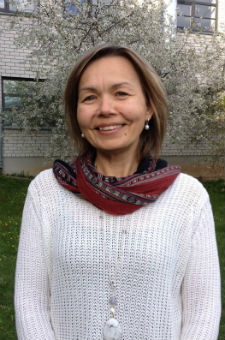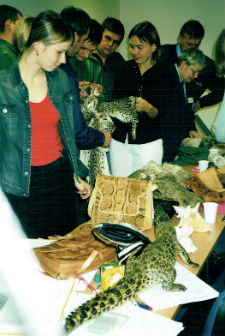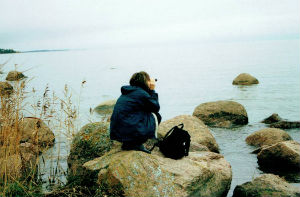Communism, creation care and Catalyst Live
Helle Liht, Assistant General Secretary of the European Baptist Federation (EBF), talks about why Eastern Europeans are not that bothered about creation care, going to church in a Communist state and who she is looking forward to seeing at Catalyst Live this October. Interview by Chris Hall
 You come from Estonia. What is Baptist life like there? Are there many Baptists?
You come from Estonia. What is Baptist life like there? Are there many Baptists?
We have 6,000 church members in our Baptist and evangelical churches that make up the Estonian Baptist Union. If you think that we have only 1.3 million people living in Estonia, then this 6,000 is probably not so tiny. We do have good strong vibrant churches, especially in the cities but our rural, country churches are struggling.
When the Soviet Union collapsed was there growth in the church in Estonia, like in other Eastern and Central European states?
When the Soviet Union collapsed, people were very interested in going to church and seeing what was happening there because it had been prohibited. But I think the church, including our churches, were not ready to face this challenge, to welcome all these different people into church. I think to a certain extent we missed that opportunity. So I can’t say we had huge growth.
You said it was prohibited. Were you a Christian at that time?
Yes, I was a member of a Christian family. We were allowed to go to church but church was prohibited to be active in the society. Young people in the schools were taught according to the Communist ideology and for them it was not recommended to go to church. If you didn’t have your parents with you, then as a young person, you would have never gone to church.
So I guess you couldn’t invite your friends from school to go to events or to come to the youth group? Would you have got into trouble for that?
We could do that and sometimes did. But because it was not supported by the society in general, I think we did not have courage always to do it. Young people were told it was stupid to believe in God, that it was for old people and from the past. It was difficult to fight with these attitudes and often we just didn’t.
Is there growth in any Estonian Baptist churches now?
We have got a couple of youth churches, one church called 3D and the one called Crossroads, that have found a niche in society and the language they use speaks to other young people (here's a link at a short film about 3D). They are the reason why our Union is growing at the moment. They seem to be doing really well.
There have been news reports that the situation in Ukraine had alarmed people in Estonia. Is that the case? Are people worried that this is part of a new period of expansionism by Russia?
I don’t think people are afraid that Russia is going to expand to Estonia. Barack Obama came to visit Talinn recently and that gave a very strong signal that Estonia is part of NATO and the alliance will support us and will protect us.
You studied environmental theology and you worked once at the Ministry of the Environment in Estonia. Climate change does not seem to be as much of a prominent issue now amongst Christians in the UK. Do you think that Christians and the church have got bored and given up caring about the environment?
 |
Helle (in white trousers and black shirt), explaining to customs officers how to recognise products made from different endangered species
|
Probably from the British perspective, it can look like people have got bored. I don’t think that so many others, including Estonians, Eastern Europeans and Central Europeans have got into the issue yet. I think the reason in Russia and Estonia is that we are living in such a nice, quiet part of Europe, where we have no hurricanes, we have no droughts, we have no floods – we have nothing. We don’t see the real need to do anything else because everything is fine. We fail to see what is happening beyond Estonia and how many people are actually suffering because of climate change. So I think there is a lot of work to be done in this area.
Did you find it hard, when you were doing conversation projects in Estonia, to get enthusiasm and funding behind them?
The conservation projects were financed by Danish, Finnish and some other international corporations. That wasn’t an issue. Working with biologists and nature conservationists – they are always enthusiastic about the environment. I think I received my enthusiasm from them because before working for the Ministry of the Environment I was a typical Estonian Baptist who didn’t really see the connection between creation care and Baptist beliefs.
But you do see the importance of creation care now, and it is something that you champion not just in Estonia but across the EBF?
Yes. After I worked in the Ministry of Environment in Estonia, I decided to study environmental theology because that was the time that I started to think about the connections between Christian faith and the creation care. Until then I had not really thought about it. Since then I have tried to develop activities and networking in this area.
As Assistant General Secretary of the EBF, what do you do?
Tony [EBF General Secretary, Tony Peck] has more of a pastoral role. I do more administrative tasks compared to Tony. I am responsible for the finances, for coordinating the European Baptist Aid work, executive meetings and council meetings. I am also happy to contribute theologically and sometimes I am asked to preach and lead Bible studies.
 Do you organise the EBF council meeting, which this year takes place in Bucharest, Romania. Will you organise that?
Do you organise the EBF council meeting, which this year takes place in Bucharest, Romania. Will you organise that?
Yes. This is our annual council meeting where all EBF member bodies come together and we do get very good attendance. We have 56 member bodies and we usually have 45 coming together. It is a good meeting with a great atmosphere and discussions.
You get to travel all over Europe and the EBF region. What are some of the favourite places you have been to?
I do like very much the Middle East. For me, coming from a Nordic country, it is an exotic place with very good food and very friendly people.
You are going to be presenting Catalyst Live. What excites you about the event? Is there anyone you are looking forward to hearing especially?
Catalyst Live last year was a very inspiring event for me, listening to all the different presentations. This year I am very much looking forward to Walter Brueggemann’s [interview], and of course, because of my environmental interest, I am very interested to listen to Sir John Houghton.
Do you think that events, like Catalyst Live, that expand our thinking are important?
I think it is very important, because it inspires and forces people to think about their convictions, to extend their understandings and to think theologically. I think as churches we do need to do that, especially in the changing society where we have so many challenges.
Helle Liht is the Assistant General Secretary of the European Baptist Federation. She is presenting Catalyst Live 2014 in Sheffield on 23 October and in Reading on 24 October. For more information and to get tickets, go to bmscatalystlive.com
Baptist Times, 23/09/2014